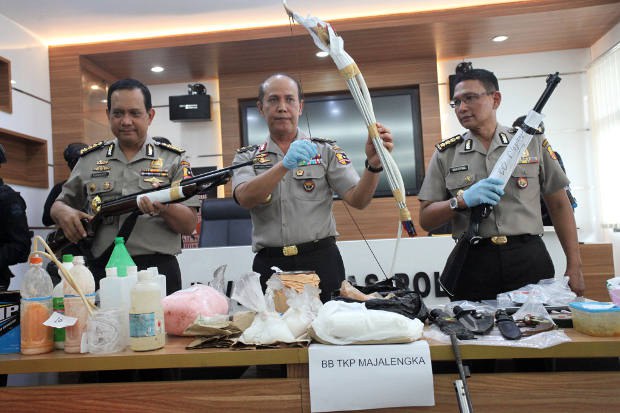Well-Educated Indonesians Joining IS: Police Official
2017.02.03
Jakarta
 Police officials Rikwanto, Boy Rafli Amar and Martunis Sitompul show reporters items seized from terror suspects, Jakarta, Nov. 30, 2016.
Police officials Rikwanto, Boy Rafli Amar and Martunis Sitompul show reporters items seized from terror suspects, Jakarta, Nov. 30, 2016.
Turkey is holding about 100 Indonesian nationals suspected of planning to enter Syria to join the Islamic State (IS), including some highly educated individuals, Indonesian police said.
The number is in addition to 22 people deported from Turkey in mid-January who were arrested upon arrival in Indonesia but subsequently released on condition they attend government training on Indonesian national ideology and society.
“Based on information from Turkish authorities, they are regular people, but there are also some intellectuals and academicians,” National Police spokesman Brig. Gen. Rikwanto said in Jakarta on Wednesday, referring to the Indonesians in Turkey.
“IS has penetrated campus mosques at home and abroad to spread their ideology. So, academics with their extensive knowledge of the material world are not necessarily safe from IS recruitment,” he said. He did not specifying which campuses.
One of the Indonesians deported from Turkey last month was an Australia-educated economist at Indonesia’s Finance Ministry who resigned in Feb. 2016, then disappeared.
In 2014, three civil servants from the Finance Ministry left for Syria. One succeeded in entering the war-torn country and two others were stopped at the border.
The IS declared a “caliphate” in June 2014 in territory it controlled at the time in Syria and neighboring Iraq.
‘Romantic images’
Some middle class people fall prey to IS recruiters because they are unaware that the group espouses killing non-believers and turning female captives into sex slaves.
“They see IS as an Islamic caliphate. Many don’t know that IS is cruel and a terrorist group,” he said.
“Recruiters persuade and seduce them with romantic images of an Islamic caliphate. Some of them just want to go there to live, not necessarily to join IS fighters,” he added.
The 100-some Indonesians are being held in Turkey for investigation by Turkish security authorities and will be sent home in groups, he added.
Contacted by BenarNews, Turkish Ambassador to Indonesia Mehmet Kadri Sander Gurbuz declined to comment.
Seventeen Indonesians were deported from Turkey on Jan. 21, and three days later, the former Finance Ministry economist and his wife and three children arrived in Bali after being deported from Turkey.
At the time Rikwanto said the family was freed because there was not enough evidence against them even though, he acknowledged, there was evidence IS recruiters had persuaded them to go to Syria.
From 2015 through January 2017, 305 Indonesians were deported from Turkey on suspicion they wanted to enter Syria, according to Foreign Ministry Data.
The National Counterterrorism Agency (BNPT) said 237 adults and 46 children from Indonesia were believed to be in Syria as of August 2016.
Eighty Indonesians have been killed in Syria and an equal number have returned home, it said.
Looking for a guru
Arif Darmawan, a BNPT senior official, said the phenomenon of IS recruiting intellectuals is not new.
“IS has always targeted not only intellectuals, but as many recruits as possible, regardless of their background,” Arif said.
The government monitors the performance, attitude and behavior of civil servants, police and soldiers while they are at work, but religious belief is largely formed outside of work hours, he noted.
“It’s difficult to monitor because of privacy rights,” he said.
Terrorism expert Noor Huda Ismail said radical ideology can spread to members of the middle class who have their material needs met yet experience spiritual emptiness.
“Many of them feel unsatisfied, then meet a group that teaches and gives answers to their questions,” he told BenarNews.
Taufik Andri, executive director of the Institute for International Peace Building in Jakarta, agreed.
“They’re looking for a spiritual guru, a mentor, and they join study groups on the Internet, without being aware that they have gotten involved with an IS group and that it’s difficult to get out of it,” he said.
For IS, successful recruitment of intellectuals or members of the middle class is a boon. Among other things, they can pay their own way to Syria.
“Academics and intellectuals are not seen as suspicious when they go through customs. They avoid immigration problems because it’s already normal for them to go abroad. Lower class people tend to get nervous,” Taufik said.
He said he hoped that Nahdlatul Ulama and Muhammadiyah – two mass Muslim organizations in Indonesia – would be more active in carrying out a strategy to counter radicalization, through sermons in mosques and madrassas, for example.
Muhammadiyah has performed that role, and promoted Islam as a solution for social problems,since its founding, according to General Chairman of Muhammadiyah Youth Dahnil Anzar Simanjuntak.
“Our approach counteracts IS recruitment efforts by educating people about the true teachings of Islam for peace and solving problems in life,” he said.







